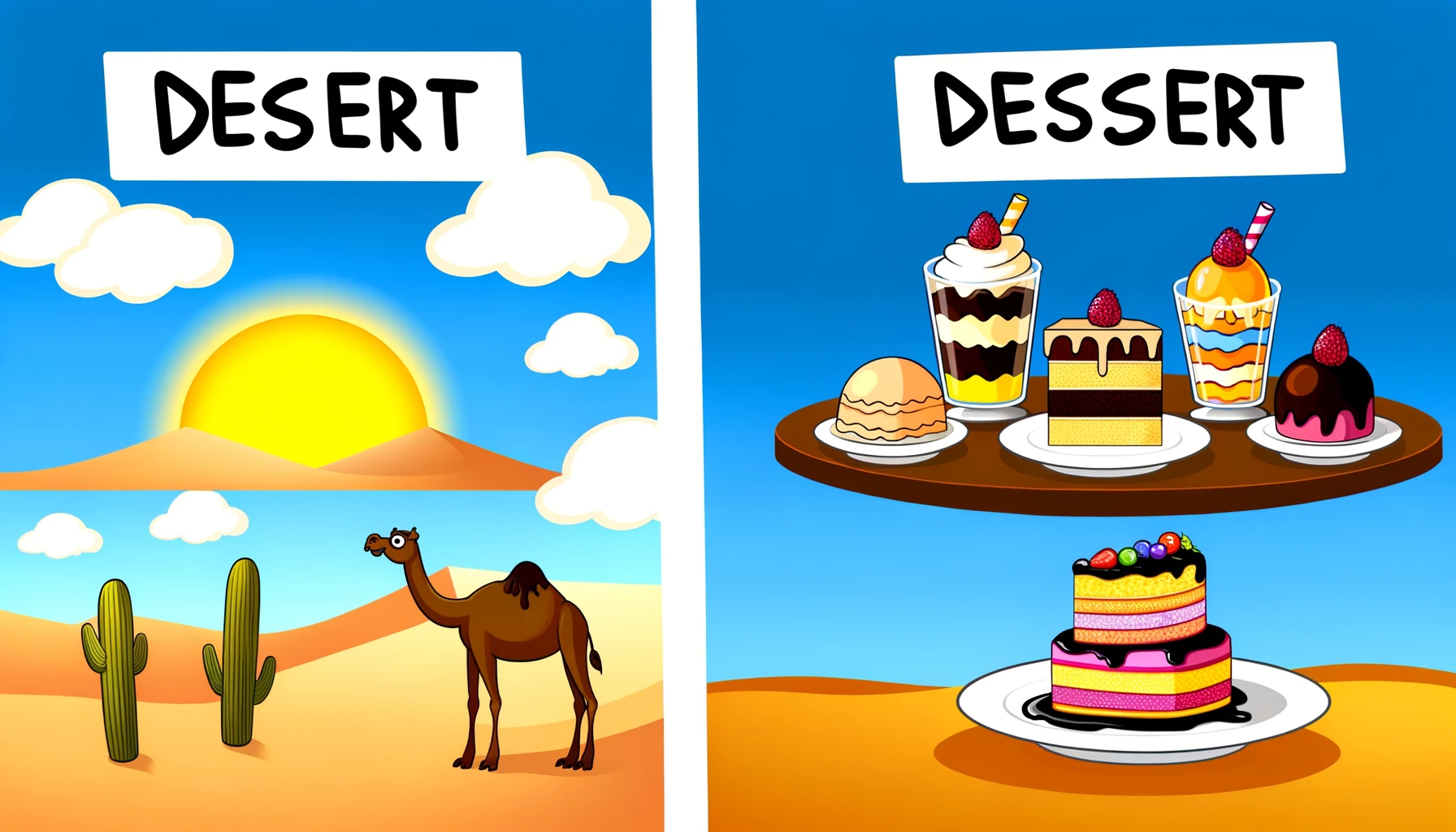
Editly Etymology: desert vs dessert
The experts at Editly have mastered commonly confused words over the course of their careers as editors, proofreaders, and humanizers. In Editly Etymology, they offer a closer look into the horrifying beauty of the English language. This installment investigates a pair of words whose confusion spreads both near and far: desert vs dessert.
Desert Definition
As a noun, desert signifies a dry and empty area of land.
Dessert Definition
Dessert means the sweet course at the end of a meal.
Did you catch that? Just to make sure, let’s ask AI to help us generate a visual representation of each of the words.
Desert = dry, empty land.

Dessert = sweets.

Desert Root
Late Middle English: from Old French, from late Latin.
Dessert Root
Mid-16th century, from French.
Who is to Blame for this Confusion?
While I usually resist the time-honored tradition of blaming French, in this case, it seems that there is no choice. Now, it’s just a matter of choosing to blame the French or the Old French. I think I’ll let them decide amongst themselves.
AI Text on Desert
The word "desert" has two primary meanings and correspondingly distinct etymological roots. Here’s a look at both meanings and their histories:
1. Desert (Arid Land)
- Latin Roots: This sense of "desert" comes from the Late Latin "desertum," meaning an abandoned or deserted place, which is the neuter past participle of "deserere," meaning to desert or abandon.
- Old French Influence: The term passed into Middle English from Old French "desert," which had maintained the Latin meaning of a deserted, uninhabited place, especially a barren and arid region.
- Modern Usage: Today, a "desert" typically refers to a large, barren landscape characterized by minimal precipitation and sparse vegetation, such as the Sahara or the Mojave.
2. Desert (Something That is Deserved)
- Old French Roots: This sense comes from the Old French word "deserte," which means that which one deserves. It stems from "deservir," meaning to deserve.
- Development in English: This term was adapted into English as "desert" and retained the meaning related to being worthy of something, often used in the context of deserving reward or punishment.
- Contextual Use: The phrase "just deserts" is a common expression derived from this usage, referring to the idea of receiving what one deserves, often in a moral or karmic sense.
These two senses of "desert" illustrate the diversity of English vocabulary, where words with the same spelling and pronunciation can have entirely different origins and meanings based on their historical development and the contexts in which they are used. This type of linguistic phenomenon is known as a homograph. (253 words)
Humanization of AI Text on Desert
"Desert" has two primary meanings and correspondingly distinct etymological roots. Here’s a look at the history of both:
1. Desert (Arid Land)
- Latin Roots: This comes from the Late Latin "desertum," meaning an abandoned or deserted place, which is the neuter past participle of "deserere," meaning to desert or abandon.
- Old French Influence: The term passed into Middle English from Old French "desert," which had maintained the Latin meaning.
- Modern Usage: "Desert" typically refers to a large, barren landscape such as the Sahara or the Mojave.
2. Desert (Something Deserved)
- Old French Roots: This sense comes from the word "deserte," meaning that which one deserves. It stems from "deservir," meaning to deserve.
- Development in English: Adapted into English as "desert" and retaining the meaning related to being worthy of something, it is often used in the context of deserving reward or punishment.
- Contextual Use: The common phrase "just deserts" derives from this usage, referring to the idea of receiving what one deserves, often in a moral or karmic sense.
These two senses of "desert" illustrate the diversity of English vocabulary, where words with the same spelling and pronunciation can have entirely different origins and meanings. (195 words)
Result of Changing the AI Text to Human Text
Humanizing has streamlined the AI text by attacking its repetition and redundancy. In fact, the AI content has been reduced from 253 words all the way down to 195 words—or by nearly 23 percent. This change has enhanced the content’s readability and effectiveness.
AI Text on Dessert
The word "dessert" has a deliciously specific history that relates to the course of a meal traditionally served after the main dishes. Here's a look at how this term evolved:
- French Origins: The word "dessert" comes from the French verb "desservir," which means "to clear the table." The term itself is derived from "des-" (a prefix indicating removal) + "servir" (to serve), indicating the removal of what has been served, specifically the main courses, making way for a sweet course at the end of a meal.
- Introduction to English: "Dessert" was adopted into English in the early 17th century from the French term. It retained the specific reference to the part of the meal served after the main courses are cleared away.
- Evolution of Meaning: Initially, in French, "desservir" referred broadly to clearing the table, but in the culinary context, it specifically came to mean the practice of serving a final, sweet course after the main meal. In English, "dessert" quickly came to denote the sweet dishes served at this stage, such as fruits, pastries, cakes, and other confections.
- Modern Usage: Today, "dessert" refers almost exclusively to sweet foods served at the end of a meal. The term encompasses a wide variety of dishes, including cakes, cookies, ice cream, fruits, and pastries, among others.
The history of "dessert" reflects its origins in dining customs and how a term can evolve from a general action (clearing the table) to a specific culinary practice (serving sweet dishes), emphasizing the close link between language and cultural practices. (258 words)
Humanization of AI Text on Dessert
"Dessert" has a deliciously specific history, as detailed below:
- French Origins: "Dessert" comes from the French verb "desservir," meaning "to clear the table." The term itself derives from "des-" (a prefix indicating removal) + "servir" (to serve), indicating the removal of what has been served, specifically the main courses, making way for an ending sweet course.
- Introduction to English: Adopted into English in the early 17th century from the French term, “desert” retained this specific meaning.
- Evolution of Meaning: Initially, in French, "desservir" referred broadly to clearing the table, but specifically came to mean the practice of serving a final, sweet course after the main meal. In English, "dessert" quickly came to denote the sweet dishes served at this stage.
- Modern Usage: "Dessert" refers almost exclusively to sweet foods served at the end of a meal.
The history of "dessert" reflects how a term can evolve from a general action (clearing the table) to a specific culinary practice (serving sweet dishes), emphasizing the close link between language and cultural practices. (174 words)
Effect of Humanizing the AI Text
Humanization has profoundly affected the AI text, making it more concise through better diction (word choice) and the elimination of repetition. This kind of concision can be measured quantitatively, as humanization has reduced the word count from 258 words to 174 words—or by more than 32 percent.
The Takeaway
Whether it’s for desert or dessert, the best AI humanizer does, in fact, turn out to be a human. So, if you need any help to humanize your AI text, don’t wait to get started on Editly.


Paul S.
Online editing, proofreading, and rewriting for both human and AI text. Specialties include admissions essays, academics, business, blogs, and ChatGPT to human text. Chief editor at Editly AI.